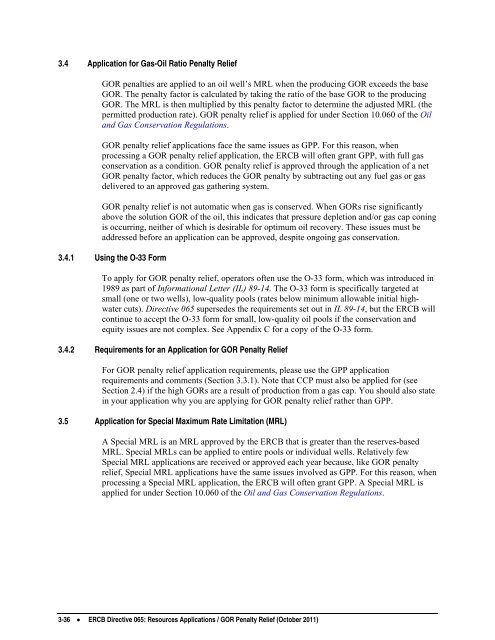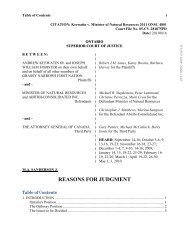Directive 065: Resources Applications for Oil and Gas Reservoirs ...
Directive 065: Resources Applications for Oil and Gas Reservoirs ...
Directive 065: Resources Applications for Oil and Gas Reservoirs ...
You also want an ePaper? Increase the reach of your titles
YUMPU automatically turns print PDFs into web optimized ePapers that Google loves.
3.4 Application <strong>for</strong> <strong>Gas</strong>-<strong>Oil</strong> Ratio Penalty Relief<br />
GOR penalties are applied to an oil well’s MRL when the producing GOR exceeds the base<br />
GOR. The penalty factor is calculated by taking the ratio of the base GOR to the producing<br />
GOR. The MRL is then multiplied by this penalty factor to determine the adjusted MRL (the<br />
permitted production rate). GOR penalty relief is applied <strong>for</strong> under Section 10.060 of the <strong>Oil</strong><br />
<strong>and</strong> <strong>Gas</strong> Conservation Regulations.<br />
GOR penalty relief applications face the same issues as GPP. For this reason, when<br />
processing a GOR penalty relief application, the ERCB will often grant GPP, with full gas<br />
conservation as a condition. GOR penalty relief is approved through the application of a net<br />
GOR penalty factor, which reduces the GOR penalty by subtracting out any fuel gas or gas<br />
delivered to an approved gas gathering system.<br />
GOR penalty relief is not automatic when gas is conserved. When GORs rise significantly<br />
above the solution GOR of the oil, this indicates that pressure depletion <strong>and</strong>/or gas cap coning<br />
is occurring, neither of which is desirable <strong>for</strong> optimum oil recovery. These issues must be<br />
addressed be<strong>for</strong>e an application can be approved, despite ongoing gas conservation.<br />
3.4.1 Using the O-33 Form<br />
To apply <strong>for</strong> GOR penalty relief, operators often use the O-33 <strong>for</strong>m, which was introduced in<br />
1989 as part of In<strong>for</strong>mational Letter (IL) 89-14. The O-33 <strong>for</strong>m is specifically targeted at<br />
small (one or two wells), low-quality pools (rates below minimum allowable initial highwater<br />
cuts). <strong>Directive</strong> <strong>065</strong> supersedes the requirements set out in IL 89-14, but the ERCB will<br />
continue to accept the O-33 <strong>for</strong>m <strong>for</strong> small, low-quality oil pools if the conservation <strong>and</strong><br />
equity issues are not complex. See Appendix C <strong>for</strong> a copy of the O-33 <strong>for</strong>m.<br />
3.4.2 Requirements <strong>for</strong> an Application <strong>for</strong> GOR Penalty Relief<br />
For GOR penalty relief application requirements, please use the GPP application<br />
requirements <strong>and</strong> comments (Section 3.3.1). Note that CCP must also be applied <strong>for</strong> (see<br />
Section 2.4) if the high GORs are a result of production from a gas cap. You should also state<br />
in your application why you are applying <strong>for</strong> GOR penalty relief rather than GPP.<br />
3.5 Application <strong>for</strong> Special Maximum Rate Limitation (MRL)<br />
A Special MRL is an MRL approved by the ERCB that is greater than the reserves-based<br />
MRL. Special MRLs can be applied to entire pools or individual wells. Relatively few<br />
Special MRL applications are received or approved each year because, like GOR penalty<br />
relief, Special MRL applications have the same issues involved as GPP. For this reason, when<br />
processing a Special MRL application, the ERCB will often grant GPP. A Special MRL is<br />
applied <strong>for</strong> under Section 10.060 of the <strong>Oil</strong> <strong>and</strong> <strong>Gas</strong> Conservation Regulations.<br />
3-36 • ERCB <strong>Directive</strong> <strong>065</strong>: <strong>Resources</strong> <strong>Applications</strong> / GOR Penalty Relief (October 2011)
















